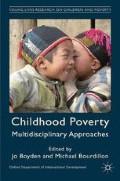Abstract
Research ethics exist to ensure that the principles of justice, respect, and the avoidance of harm are upheld, by using agreed standards. These principles are universal, though there many subtleties and diversities, and how principles are understood, interpreted, and practised can vary from place to place (Ulrich 2003). Following controversies involving deception and political involvement by researchers in the social sciences, ethical codes building on these principles were developed. These codes built on earlier ones developed for medical research on humans in the Nuremburg Code (1947, following the war crimes trials) and the Declaration of Helsinki (1964). The governance of research has expanded and now includes ethical practices in social research in general (ESRC 2005, 2010) and with children in particular (Alderson and Morrow 2011; Schenk and Williamson 2005). A burgeoning literature describes the processes, practices, and difficulties that occur in social research (see, for example, Armbruster and Laerke 2008; Iphofen 2009; Mertens and Ginsberg 2009; van den Hoonard 2002).
The author would like to thank the children and families and communities; fieldworkers for faithfully recording their observations; Young Lives staff in the study countries for their invaluable experiences and insights from fieldwork; and Maggie Black, Caitlin Porter, and Young Lives staff in Oxford, who all provided many helpful comments.
Access this chapter
Tax calculation will be finalised at checkout
Purchases are for personal use only
Preview
Unable to display preview. Download preview PDF.
References
Alderson, P. (1998) ‘Confidentiality and Consent in Qualitative Research’, BSA Network 69: 6–7.
Alderson, P. and V. Morrow (2011) The Ethics of Research with Children and Young People: A Practical Handbook, London: Sage.
Ames, P. (2009) ‘Peru Data Gathering Report: Second Qualitative Round of Data Collection in 2008’, internal document, Oxford: Young Lives.
Armbruster, H. and A. Laerke (2008) Taking Sides: Ethics, Politics and Fieldwork in Anthropology, Oxford: Berghahn.
ASA (Association of Social Anthropologists) (1999) Ethical Guidelines for Good Research Practice, www.theasa.org (accessed 8 April 2010).
Brown, N., M. Boulton, G. Lewis and A. Webster (2004 version 2) Social Science Research Ethics in Developing Countries and Contexts, ESRC Research Ethics Framework Discussion Paper 3, www.esrc.ac.uk (accessed 7 April 2009).
Creed-Kanashiro, H., B. Ore, M. Scurrah, A. Gil and M. Penny (2005) ‘Conducting Research in Developing Countries: Experiences of the Informed Consent Process from Community Studies in Peru’, Journal of Nutrition 135: 925–8.
Dyer, S. and D. Demeritt (2009) ‘Un-Ethical Review? Why it is Wrong to Apply the Medical Model of Research Governance to Human Geography’, Progress in Human Geography 33.1: 46–64.
ESDS (Economic and Social Data Service) (n.d.) Legal and Ethical Issues in Interviewing Children, www.esds.ac.uk (accessed 12 April 2008).
ESRC (Economic and Social Research Council) (2005) Research Ethics Framework, www.esrc.ac.uk (accessed 7 April 2009).
ESRC (Economic and Social Research Council) (2010) Framework for Research Ethics, www.esrc.ac.uk (accessed 8 April 2010).
Fairhead, J., M. Leach and M. Small (2005) ‘Public Engagement with Science? Local Understandings of a Vaccine Trial in the Gambia’, Journal of Biosocial Science 38: 103–16.
Goodenough, T., E. Williamson, J. Kent and R. Ashcroft (2003) ‘“What Did You Think About That?” Researching Children’s Participation in a Longitudinal Genetic Epidemiological Study’, Children and Society 17.2: 113–25.
Hammersley, M. (2009) ‘Against the Ethicists: On the Evils of Ethical Regulation’, International Journal of Social Research Methodology 12.3: 211–25.
Iphofen, R. (2009) Ethical Decision-Making in Social Research, Basingstoke: Palgrave Macmillan.
McGregor, J. (2006) ‘Does the Use of Human Subjects in Research in Developing Nations Violate Their Human Rights? If So, Are Reparations an Appropriate Response?’, Journal of Social Philosophy 37.3: 441–63.
Mertens, D. and P. Ginsberg (2009) The Handbook of Social Research Ethics, London: Sage.
Nyambedha, E. (2008) ‘Ethical Dilemmas of Social Science Research on AIDS and Orphanhood in Western Kenya’, Social Science and Medicine 67: 771–9.
Olivier de Sardan, J.P. (2005) Anthropology and Development. Understanding Contemporary Social Change, London: Zed Books.
Outes-Leon, I. and S. Dercon (2008) ‘Survey Attrition and Attrition Bias in Young Lives’, Technical Note 5, Oxford: Young Lives.
Save the Children (2003) Child Protection Policy, www.savethechildren.net/alliance/resources/child_protection.pdf (accessed 21 July 2009).
Schenk, K. and J. Williamson (2005) Ethical Approaches to Gathering Information from Children and Adolescents in International Settings: Guidelines and Resources, Washington DC: Population Council.
Tafere, Y., W. Abebe and A. Assazinew (2009) ‘Ethiopia Data Gathering Report 2008: Second Qualitative Round of Data Collection’, internal document, Oxford: Young Lives.
Truong, H.C. (2009) ‘Qualitative Sub-Study on Ethnic Minority Education in Vietnam: Data Gathering Report’, internal document, Oxford: Young Lives.
Ulrich, G. (2003) ‘Charges and Counter-charges of Ethical Imperialism: Towards a Situated Approach to Development Ethics’ in P. Quarles van Ufford and A.K. Giri (eds) A Moral Critique of Development: In Search of Global Responsibilities, London: Routledge.
Van den Hoonard, A. (2002) Walking the Tightrope: Ethical Issues for Qualitative Researchers, Toronto: University of Toronto Press.
Vasquez del Aguila, E. (2007) ‘Myth, Rumor, Resistance and Structural Inequalities in Colonial and Modern Peru’, Unpublished paper, Sociomedical Sciences and Anthropology, Columbia University-Mailman School of Public Health, New York, http://interculturalidad.org (accessed 19 May 2009).
Vennam, U. (2009) ‘Andhra Pradesh, India, Data Gathering Report 2008: Second Qualitative Round of Data Collection’, internal document, Oxford: Young Lives.
Wendler, D., J. Rackoff, E. Emanuel and G. Grady (2002) ‘Commentary: The Ethics of Paying for Children’s Participation in Research’, Journal of Pediatrics 141.2:166–71.
Young Lives (2009) ‘Memorandum of Understanding for Young Lives Field Researchers. Key Points: Respecting Children in Research’, internal document, Oxford: Young Lives.
Editor information
Editors and Affiliations
Copyright information
© 2012 Virginia Morrow
About this chapter
Cite this chapter
Morrow, V. (2012). The Ethics of Social Research with Children and Families in Young Lives: Practical Experiences. In: Boyden, J., Bourdillon, M. (eds) Childhood Poverty. Palgrave Studies on Children and Development. Palgrave Macmillan, London. https://doi.org/10.1057/9780230362796_3
Download citation
DOI: https://doi.org/10.1057/9780230362796_3
Publisher Name: Palgrave Macmillan, London
Print ISBN: 978-1-349-33982-2
Online ISBN: 978-0-230-36279-6
eBook Packages: Palgrave Political & Intern. Studies CollectionPolitical Science and International Studies (R0)

